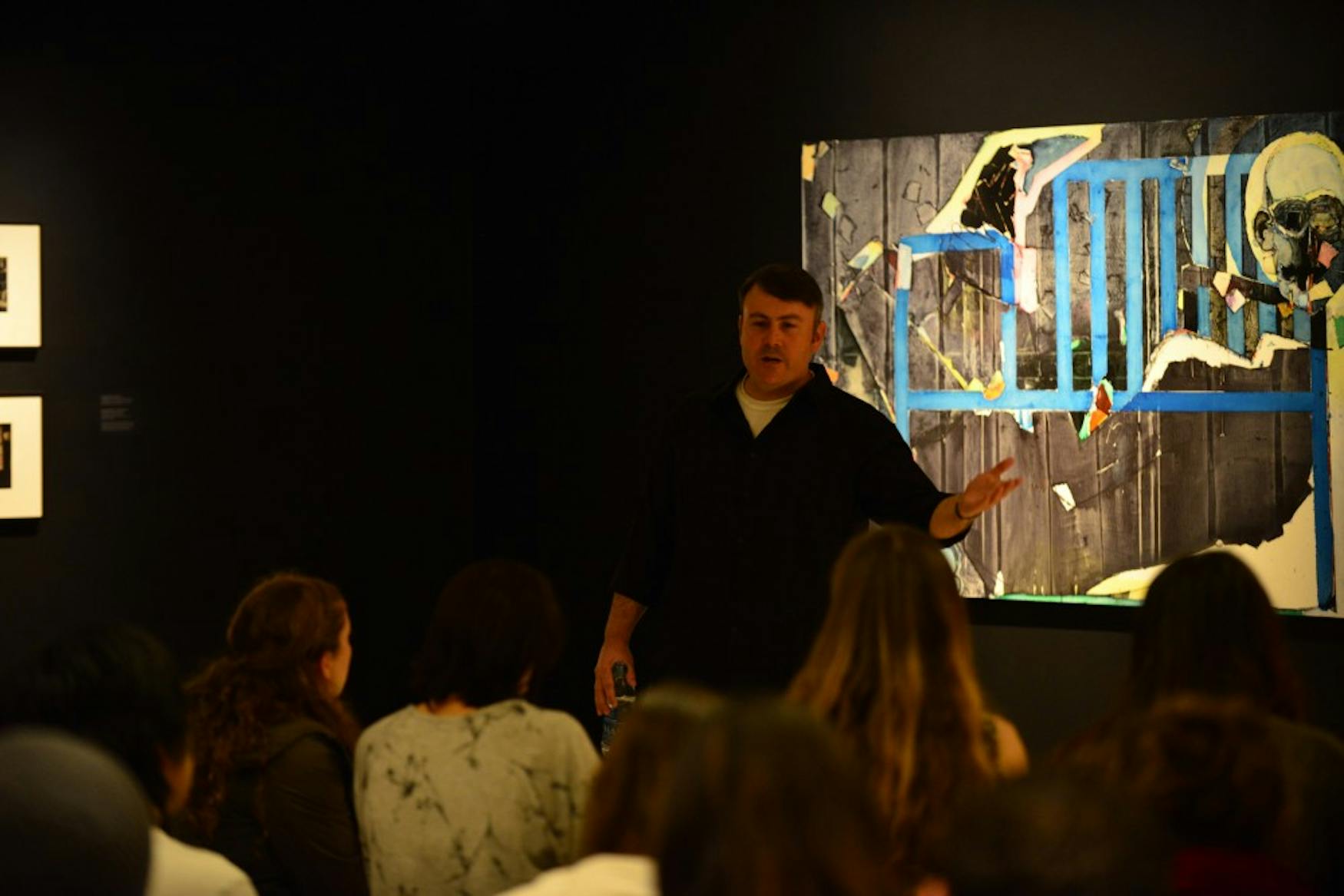Pitts discusses psychological effects of war
The Student Committee for the Rose Art Museum and the Psychology Club extended the hours at the Rose Art Museum on Thursday evening to present a symposium of 1914: Magnus Plessen. The museum, which usually closes at 5 p.m., stayed open until 9 p.m. as Kenneth Pitts, a Ph.D. candidate in the Psychology department, led a discussion on post traumatic stress disorder and the psychological effects of war based on the exhibit, which also deals with war themes. The 50 or so people who attended the talk were treated to tours of the museum and dinner from a Sodexo’s food truck.
A former United States Army and National Guard veteran himself, Pitts’ experiences in combat gave him a unique perspective on 1914: Magnus Plessen. The exhibit uses paintings, books, collage art and wax molds to portray the after-effects of war. It focuses on the veterans who were disfigured in combat, and Pitts’ talk built upon this subject by discussing the ways in which war negatively impacts veterans’ mental states.
One subject that Pitts highlighted was how PTSD can impact the way memories are retained. He mentioned memory reconsolidation, which is when a person replays a memory in their mind and alters the memory in the process. Pitts spoke about a memory that he had reconsolidated from a peacekeeping mission in Bosnia.
In Bosnia, Pitts’ platoon was tasked with guarding a mass grave that the enemy had hidden under a garbage dump. The group of soldiers patrolled the site all hours of the day, seven days a week, in order to protect it until it could be excavated. At one point between patrol shifts, Pitts was driving and noticed a child’s sock on the side of the road. At the time, Pitts did not consider that moment particularly significant. However, after he returned from his deployment, he returned to this memory.
Pitts began to question if the sock had belonged to one of the people killed and buried in the mass grave or if it was simply a discarded relic from the garbage dump. He kept returning to this image of the lone sock and reconsolidating the memory in the process. Over time, thinking about the image recalled a lot of emotion, and it became difficult for Pitts to reflect on the memory.
This reaction is part of what Pitts called a “deployment hangover.” Pitts mentioned that veterans have difficulty returning to normal life after adapting to such extreme conditions during their deployments. Veterans can feel as though they are constantly getting left behind as they struggle to make up for lost time in their relationships, education and careers.
Pitt was deployed three times, and each time, his “deployment hangover” worsened when he returned home. After his first deployment, it took Pitts a month to return to his routine. After his second, it took him eight months. He said that he is still adjusting and recovering from his third tour.
Pitts was careful to mention that being a veteran should not be defined by its negative aspects. He remarked that there were times during his deployment where he felt more alert and engaged than he ever had in his life. Specifically, Pitts mentioned a time when he was on guard duty on Christmas Eve and a platoon singing Christmas carols brought him and the other guard to tears. Although he describes himself as an atheist, Pitts said that something about that moment felt incredibly sentimental.
The talk closed with a question-and-answer session, and one attendee asked if 1914: Magnus Plessen struck Pitts as exploitative in depicting veterans’ trauma. Pitts responded that, as a veteran, he did not feel exploited by the exhibit. He elaborated that if an artist wants to focus their work on veterans’ issues, why censor the artist? Another attendee asked if Pitts experienced any unexpected difficulties after returning from his deployments and how he dealt with them. In his answer, Pitts emphasized the importance of maintaining a healthy lifestyle—exercise and sleep were (and are) crucial to his recovery.
Pitts closed the talk by stressing the idea of an authentic identity. He explained that one should preserve their identity and avoid “losing themselves” in their relationships with other people. This brought the talk’s trajectory from a discussion about an extreme psychological experience to advice that the audience could use to cope with the simple stress of living.



Please note All comments are eligible for publication in The Justice.